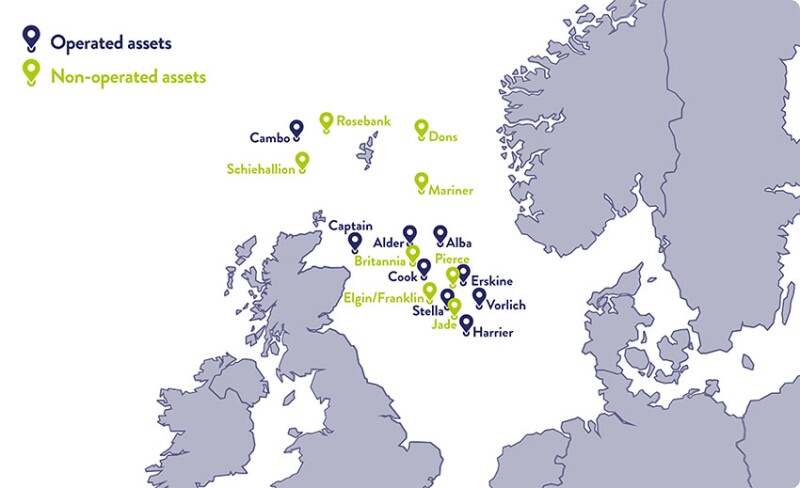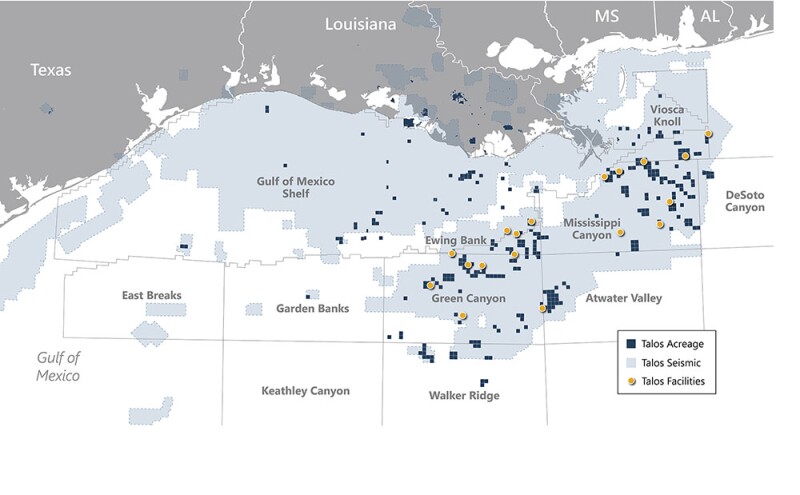Talos Announces Plans in Gulf of Mexico
Talos Energy discovered oil and natural gas at its Ewing Bank 953 well in the US Gulf of Mexico (GOM). The well found 127 ft of net pay at 19,000‑ft depth, with estimated recoverable resources of 15 to 25 million BOE and expected production of 8,000 to 10,000 BOE/D by mid-2026. The well will be tied back to the South Timbalier 311 platform. Walter Oil & Gas Corp. is serving as operator with 56.7% interest with partners Talos (33.3%) and Gordy Oil Company (10%).
The company also announced it joined the Sebastian prospect drilling in the Mississippi Canyon Block 387 of the GOM. Drilling at Sebastian began in August and the company is targeting the Upper Miocene K-1 reservoir at approximately 12,000-ft TVD. The prospect contains an estimated gross resource potential of 9 to 16 million BOE with a potential initial production rate of 6 to 10 million BOE/D. Results from the project are expected in Q4 2024 and if successful, the prospect will be tied back to the Delta House facility where Talos has a partial interest.
Sonatrach and CPECC Partner To Boost Production
Sonatrach signed a $210-million contract with China Petroleum Engineering & Construction Corp. to boost production at the Alrar gas field in Algeria’s Illizi Basin. The project aims to maintain output at 10 million m3/D by installing three compression trains, upgrading surface equipment, and enhancing safety and control systems. The work, including new booster pumps and an electrical substation, will be completed within 32 months, with commissioning scheduled for Q2 2027.
Vista Energy Invests Big in Argentina
Vista Energy plans to invest $1.1 billion this year in Argentina’s Vaca Muerta shale deposit to boost production and cut costs by double digits, according to CEO Miguel Galuccio. In a Reuters interview, Galuccio outlined Vista’s growth strategy for what is the largest shale project outside the US, and highlighted its importance for the country’s energy sector.
Since 2022, production has doubled to 65,000 BOEPD and is expected to reach 100,000 BOEPD by 2026 and 150,000 BOEPD by 2030. The company plans to invest in new wells and infrastructure across 200,000 acres in Neuquen province, where it has identified 1,150 well locations.
Vista has added its third drilling rig and plans to introduce a second fracturing crew in Q4.
Galuccio also highlighted pipeline capacity challenges and announced plans to double the Oldelval (pipeline operator) network and expand the Vaca Muerta Sur and Norte pipelines.
Ithaca Progresses in UK Projects
Ithaca Energy announced progress on the company’s various offshore UK projects at the Captain field in the Outer Moray Firth, approximately 90 miles northeast of Aberdeen, in water depths of around 346 ft. The second phase of enhanced oil recovery began in May with polymer injection into subsea wells, and preparations for a topside drilling campaign are underway.
At the Rosebank project, nine subsea structures were installed ahead of schedule, and modifications on the Knarr FPSO continue in Dubai. A front-end engineering and design study for electrification of Captain facilities is complete, but final decisions will depend on fiscal conditions.
Ithaca also reinstated production at the Erskine gas field, though compressor issues have affected output.

Discovery Made in Zimbabwe’s Carbora Bassa Project
Invictus Energy discovered a significant prospective resource of 184,000 bbl of condensate at its Cabora Bassa project in Zimbabwe, following a prior gas find at Mukuyu 2. The company identified eight key prospects in the eastern Cabora Bassa Basin, with a total of 2.9 Tcf of gas and 184,000 bbl of condensate.
The next exploration phase will target the Musuma prospect, estimated to contain 1.17 Tcf of gas, alongside further appraisal drilling in the Mukuyu gas field. Invictus holds an 80% stake in the project, giving it a net share of 2.3 Tcf of gas and 147,000 bbl of condensate.
Invictus is working on a phased multistream approach to unlock value of the Cabora Bassa Project with projects including gaining a better understanding of the Mukuyu gas field through processing of 2D seismic and 3D seismic data for future exploration campaigns.
CNOOC Sees Success in Two Projects
CNOOC Ltd. started production at the Wushi 17-2 oil fields in the Beibu Gulf, with an average water depth of around 28 m, featuring a new wellhead platform and processing terminal. The project includes 43 development wells and aims for peak production of 9,900 B/D by 2026.
The company also announced successful drilling of a natural gas well in the ultradeepwater Liwan 4-1 structure in the Pearl River Mouth Basin. The well, in the hydrocarbon-rich Baiyun Sag, approximately 300 km southeast of Shenzhen, was drilled to a vertical depth of nearly 3000 m and finished at a depth of almost 4400 m, revealing a gas pay zone of around 650 m in the horizontal section.
Testing revealed an absolute open-flow natural gas production rate of 430,000 m3/D and marked a breakthrough in carbonate rock exploration offshore China.
“Previously, exploration in China’s ultradeepwater areas mainly focused on clastic rocks. The success of this well has, for the first time, revealed the enormous potential of carbonate rocks in China’s ultradeep waters, marking significant breakthroughs in both exploration understanding and operational techniques,” said CNOOC Chief Geologist Xu Changgui.
CNOOC serves as operator and holds an 80% stake in the project.
Drilling Begins at Who Dat South
LLOG Exploration began drilling the Who Dat South well in the US Gulf of Mexico in early September, targeting two Miocene turbidite reservoirs. The well, MC 545-1, is located 11 km from the Who Dat FPS at a water depth of 780 m, with drilling expected to reach 7500 m and take 50 to 60 days. The site is within tieback distance to the Who Dat G subsea manifold (6 km) and the FPS (11 km). Netherland Sewell and Associates estimates the prospect holds 31 MMBOE of gross unrisked prospective 2U resources, with a 52% geological success probability.
The Who Dat producing assets comprise the Who Dat, Dome Patrol, and Abilene oil and gas fields and associated infrastructure in the Mississippi Canyon, offshore Louisiana in approximately 800-m water depth.
LLOG serves as operator and holds a 45% stake with partners Karoon Energy (30%) and Westlawn Americas Offshore (25%).
Natural Gas Discovery in Norwegian Sea
OMV AG discovered natural gas in the Norwegian Sea, about 65 km southwest of the Aasta Hansteen field. The wildcat well 6605/6-1 S, known as Haydn/Monn, encountered an estimated 30 to 140 million BOE. The well was drilled to a depth of 1064 m and is the first in production license (PL) 1194 which was granted in February 2023.
PL1194 partners will continue to evaluate the discovery for a potential gasfield development to the nearby infrastructure which may lead to a subsea development tied to the Aasta Hansteen platform, offering lower costs and a reduced carbon footprint.
OMV, which holds a 15% interest in Aasta Hansteen, sees this as an opportunity to extend the gas hub’s life.
In PL1994, OMV serves as the operator and holds 40% interest with partners Vår Energi (30%) and Inpex (30%).
Petroecuador Seeks Operator
Petroecuador will initiate a new bidding process to find an international operator for its offshore Campo Amistad gas field. This field, Ecuador’s only offshore energy operation, currently produces around 21 MMcf/D day from three of its 17 drilled wells.
According to a statement by the company, “Intense work and evaluation of possible interventions and reconditioning of the existing wells was carried out but an economically viable solution could not be found. Petroecuador does not have the technical know-how or necessary personnel to undertake this operation.”
Uganda Set To Issue New Licenses
Uganda plans to issue new oil and gas exploration licenses in the 2025/2026 fiscal year to boost investment and economic growth, according to the country’s Finance Minister Matia Kasaija. The last licensing round concluded in early 2023, granting two of five available blocks.
Kasaija emphasized that accelerating oil and gas investments is crucial for Uganda’s growth, with commercial oil production set to begin next year in the Albertine Graben basin, where 6.5 billion bbl of oil have been discovered.


